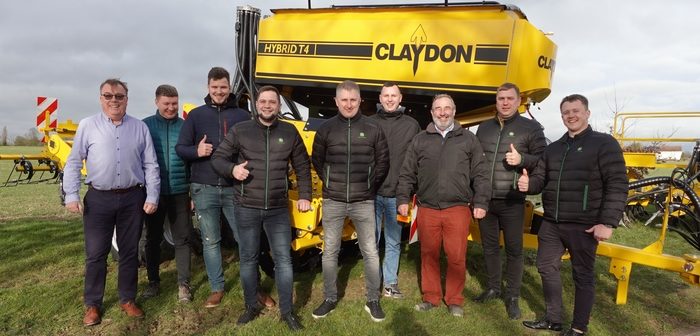Staff from DOJUS Agro, the largest supplier of Western farming equipment in the Baltics, have visited Suffolk-based agricultural machinery manufacturer Claydon Yield-o-Meter Limited at Wickhambrook near Newmarket to learn more about the company’s pioneering Opti-till® strip seeding technique and its latest products, including the new 9m Straw Harrow and nine-model range of Evolution mounted drills.
European market leader in this economically and environmentally beneficial crop establishment technology, Claydon is the progressive, family-owned manufacturer of Opti-till® products. During the first few weeks of 2022 the value of its sales to export markets in Eastern Europe has already exceeded those for the whole of 2021, which despite the ongoing challenges of COVID-19 and Brexit was itself a record year. Employing 60 staff, Claydon exports 60% of production to 33 countries, across Europe to New Zealand and Chile.
Based in Lithuania, DOJUS Agro has been successfully involved in the agricultural sector for 25 years and operates in Lithuania, Belarus, Russia’s Kaliningrad Region and Latvia, where Claydon machinery has been on farms for the last 10 years. The company represents a range of leading agricultural machinery manufacturers and became Claydon’s distributor for Lithuania in 2018.
“We are delighted to be working with DOJUS Agro, a large, well-respected organisation with very high standards,” states Andrei Botnari, Claydon’s Export Territory Manager, who develops and supports Claydon’s dealers and customers across 20 countries, mainly in Central and Eastern Europe. “During the last few months, our service engineers have travelled to Lithuania and Latvia to train DOJUS Agro’s technicians and this visit by eight product specialists, sales staff and agronomists is the first of three planned for the next two months.”
During their visit, the group toured Claydon’s factory to see the company’s products being manufactured, as well as sharing their knowledge and experience of Opti-till® machinery in their own markets. Claydon’s CEO Jeff Claydon explained why he developed the Opti-till® System of crop establishment in 2002, then showed them around his family’s arable farm at Wickhambrook before the group visited various local attractions, including Bury St Edmunds, and Cambridge. The guests returned home with a much greater understanding of Claydon, its products and how they can benefit farmers in the Baltics.
Andrei Botnari, who graduated from the State Agrarian University of Moldova with a Bachelor of Applied Science in Agronomy and Crop Science, says that the 2021 COP26 climate change summit in Glasgow accelerated the need for farmers to change to more economically, timely and environmentally sustainable methods which reduce costs and crop inputs, whilst improving soil health and benefitting the environment.
“Regenerative agriculture is becoming increasingly important for farmers all over the world, including those in the Baltic countries. They are pioneers in the use of this technology and are looking to reduce costs by using a system which can cope with the climate. Claydon’s innovative products help to promote regenerative agriculture in many ways, such as rebuilding soil organic matter, improving water management and restoring the biodiversity of soils degraded by conventional cultivations.”
Since launching its first drill in 2003, Claydon has emphasised the importance of soil health and raised awareness of how to improve it. The company’s products are manufactured to an exceptionally high standard, extremely versatile and eliminate the need to operate more than one drill. Farmers throughout the world are achieving excellent results using Claydon Opti-Till® products on all types of soil, in different climatic conditions and for all types of crops that can be air sown.
The Opti-Till® System is based around Claydon’s trailed and mounted drills from 3m to 8m wide, all of which incorporate the company’s unique, leading tine technology for exceptional ability and versatility. Claydon’s product line also includes Straw Harrows from 3m to 15m which reduce weed burdens and slug populations, the 6m TerraStar® light rotary cultivator for situations where more soil movement is required, together with TerraBlade inter-row hoes from 3m to 8m wide which provide a low-cost, mechanical method of controlling weeds in combinable band-sown crops.




